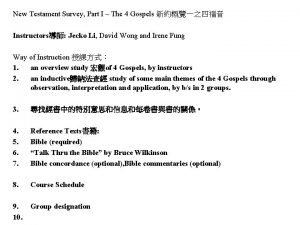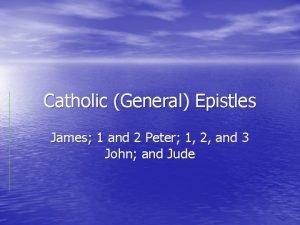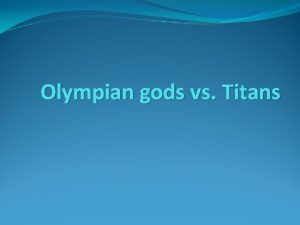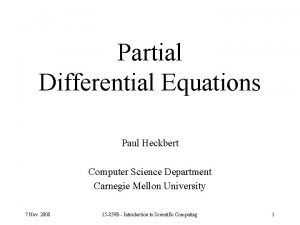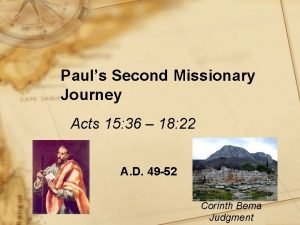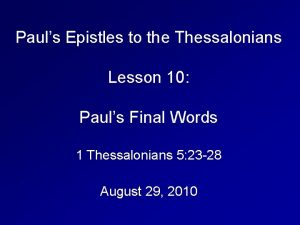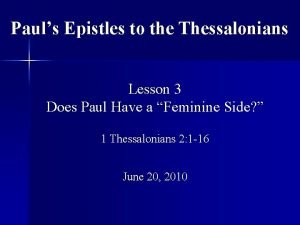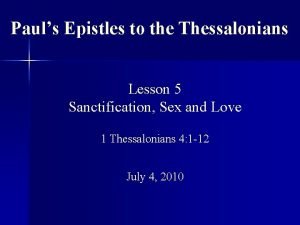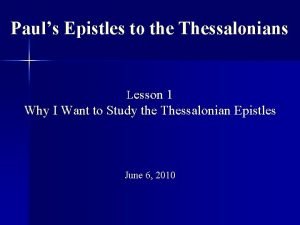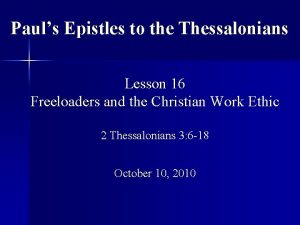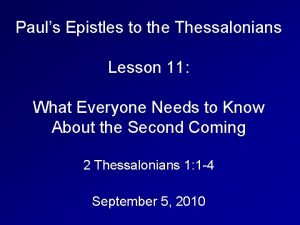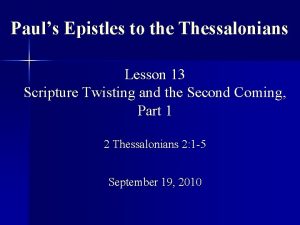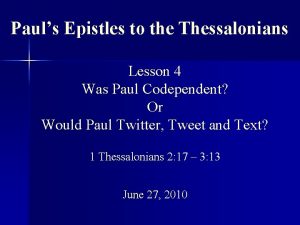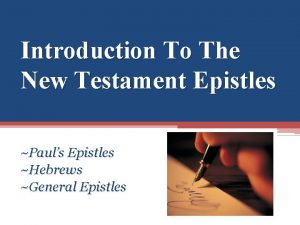Pauls Epistles to the Thessalonians Lesson 12 Gods












- Slides: 12

Paul’s Epistles to the Thessalonians Lesson 12: God’s Sovereignty, the Second Coming, and the Suffering of the Saints 2 Thessalonians 1: 5 -12 September 12, 2010





I. Introduction to Lesson 12 A. The Christian life is not a cruise ship 1. 2. 3. 4. Luke 9: 23, 57 -62 Mark 4: 16 -17; John 6: 47 -66 Luke 19: 37 -38; 23: 33 -37 Matthew 24: 9 -10 B. Thessalonian saints knew this 1. Paul had come from Philippi (1 Th. 2: 1 -2) 2. Paul warned they would suffer (1 Th. 3: 3 -4) 3. And suffer they did (1 Th. 2: 14 f. ) 4. But they also thrived in their adversity. a. b. 1 Thes. 1: 2 -10; 2: 13 -16 2 Thes. 1: 3 -4 5. Now Paul turns to the sovereignty of God & Second Coming as their solace in suffering.

II. God’s purposes for persecution and suffering (2 Thessalonians 1: 5 -10). A. Observations 1. Three terms are used for suffering here. 2. Use of Old Testament language, terms. 3. “Righteous judgment” here (vs. 5) = justice for both the wicked and the godly. 4. Justice is executed at the Second Coming. 5. This is when the saints’ suffering and persecution end & wicked are punished. 6. More attention given to fate of unbelievers, who are their persecutors. 7. The Second Coming in 1 Thessalonians compared with our text in 2 Thessalonians.

II. God’s purposes for persecution and suffering (2 Thessalonians 1: 5 -10). B. The Second Coming, righteous judgment, and unbelievers. 1. The basis for their condemnation: a. Unbelief (vs. 8) b. Disobedience to gospel (vs. 8) c. Persecution of saints (vs. 6) 2. Their penalty a. Payback (vs. 6) b. Eternal destruction away from God’s presence & from His glory

C. Persecution, the Second Coming, righteous judgment, and believers. 1. The basis of their salvation: calling (vs. 11) and belief (vs. 12) 2. The purpose of persecution is to prepare & prove saints worthy of the kingdom of God (vs. 5; Romans 5: 1 -5; 1 Peter 1: 3 -9). 3. The Second Coming: punishment for those who have persecuted the saints (Romans 12: 17 -21; 1 Thes. 5: 15; Psalm 73). 4. The Second Coming will give saints rest from their persecution and affliction. 5. Second Coming: God is glorified in and by the saints.

D. Problem: Why the emphasis on works? (Matt. 5: 20; John 5: 24 -29; Rom. 2: 1 -10; Revelation 20: 12 -15; 21: 10 -15) E. Solution: 1. Rewards 2. Godly works precipitate persecution (1 Peter 2: 11 -12; 4: 1 -5) 3. Works are an evidence of faith a. Hebrews 11 b. Luke 3: 7 -14 c. 1 Thes. 1: 2 -4 4. Ultimately, it is all of God. . . (2 Thessalonians 1: 10 -11)

III. Problem solved (verses 11 & 12) A. Paul prays for God to make the Thessalonians worthy of His calling (vs. 11). B. Paul prays that God will, by His power 1. Fulfill every desire for goodness 2. Fulfill every work of faith C. To the glory of God (not men) 1. Through men whose lives He has changed 2. By the praise of those whom He saved D. By God’s grace IV. Conclusion A. This is not prosperity preaching! B. The sovereignty of God & the suffering of His saints. Suffering is for our good and His glory. C. Prophecy and Prayer

IV. Conclusion D. Payday Someday: Heaven or Hell E. Hell is a moral necessity. F. Cruise ship or battleship? 1. Self-indulgence or personal sacrifice 2. Mission: to serve, or to be served? 3. The price we are willing to pay 4. The Captain: our commander-in-chief, or our social director? (Is He serving us, or are we serving Him? ) 5. Chain of command? 6. Our relationship to others on board ship 7. Our responsibility to others on board ship
 Chronology of pauline epistles
Chronology of pauline epistles Test: the general epistles new testament survey
Test: the general epistles new testament survey Twelfth night poem
Twelfth night poem Pauline epistles
Pauline epistles Test: the general epistles
Test: the general epistles Titans vs olympians greek mythology
Titans vs olympians greek mythology I must have drunk four cups of cocoa
I must have drunk four cups of cocoa Nyandoche ibere secondary school
Nyandoche ibere secondary school Classification of pde examples
Classification of pde examples Map of corinthians
Map of corinthians Pauls second missionary journey
Pauls second missionary journey Eportal st pauls monasterevin
Eportal st pauls monasterevin Paulu koelju darbi
Paulu koelju darbi



